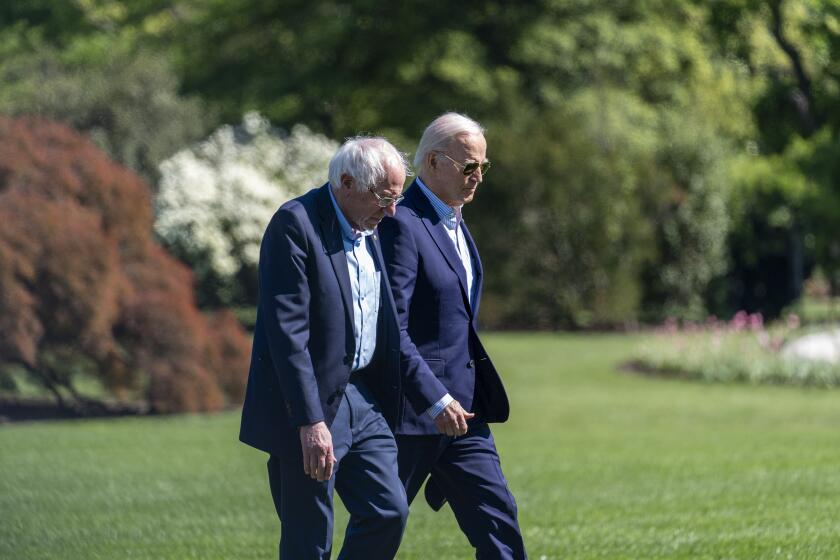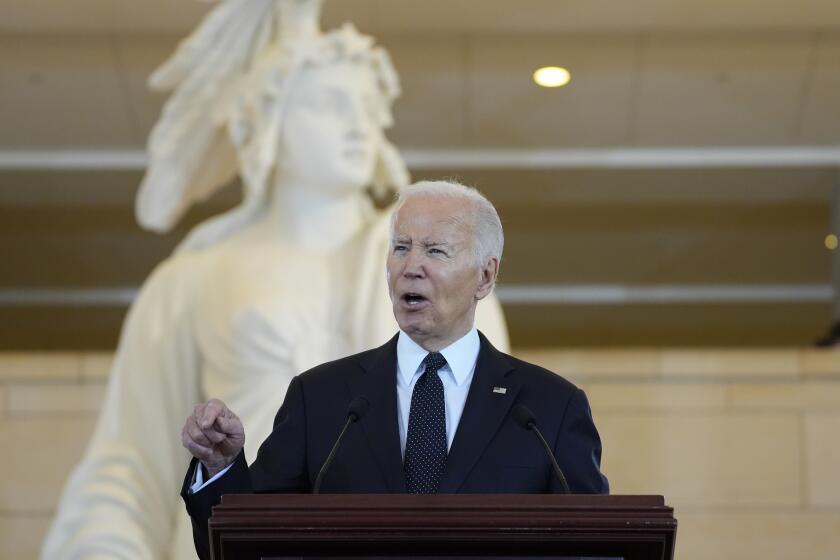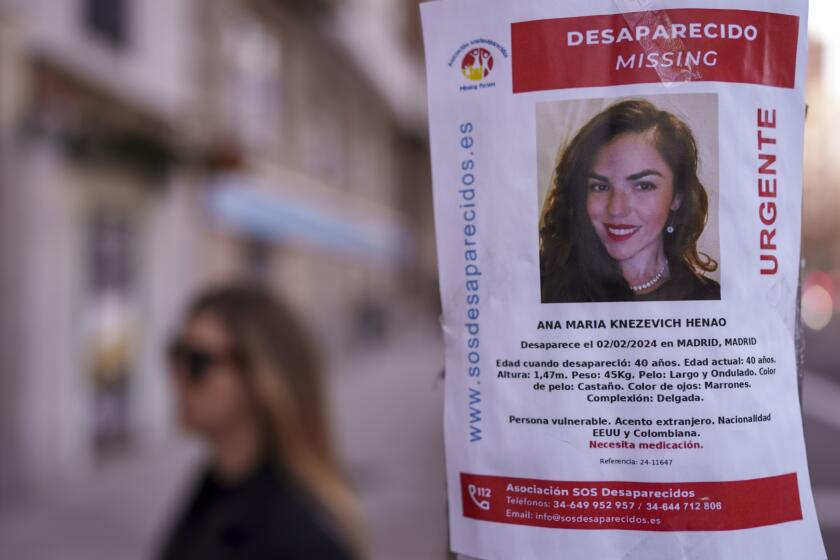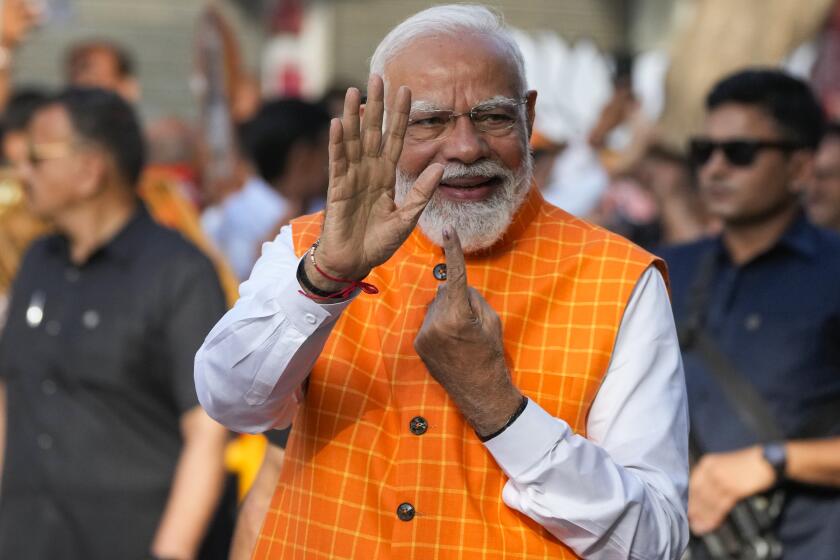Students Stage Bold Protest in Colombia : Outraged by Drug Violence, Tens of Thousands Defy Cartels, March Silently Through Capital
Defying Colombia’s powerful and violent cocaine cartels, tens of thousands of students marched silently through central Bogota on Friday in a demonstration against drug killings and corruption.
The mass outpouring of students from a dozen universities illustrated a widespread feeling of outrage here over a wave of assassinations and a bold declaration of war by drug barons against the country’s leadership. The government of President Virgilio Barco Vargas also has escalated its war against the traffickers.
In a televised address Friday night, Barco urged Colombians to close ranks in a “national crusade” against narcotics traffickers, “a crusade that undoubtedly will leave us with more blood, pain and suffering, but from which I am sure we will emerge victorious.”
‘Bring Them to Justice’
The president said the government’s enforcement drive is breaking up networks of support for drug traffickers. “We will find the capos, and we will bring them to justice,” he predicted.
But he emphasized that the battle against cocaine trafficking cannot be won by Colombia alone.
“Only with a concerted international action and only if the use of narcotics is reduced in consumer nations can we definitely win this war,” Barco said.
A hand-lettered banner carried by marchers Friday said, “All Against the Mafia.” Another declared: “Colombia Does Not Fear Violent Minorities.”
Midday traffic stalled in Bogota, a city of 6 million people, as long processions of students converged downtown and then moved slowly along a freeway to the main cemetery. Some students wore black armbands, and others held red, yellow and green Colombian flags trimmed with black mourning stripes.
A few carried large posters of Sen. Luis Carlos Galan, a leading candidate for the presidential elections next March, who was fatally shot Aug. 18 at an outdoor campaign rally.
“If You Have Consumed Drugs, You Killed Galan,” one banner said. “Change Sides Now. This Is Our War.”
Galan, especially popular among young Colombians, was an outspoken opponent of drug traffickers. The cartels are being blamed for his death and for those of a high court judge and a police commander in the same week.
The judge had issued a ruling against Pablo Escobar, top leader of the Medellin cartel, while the officer was commander of national police in Medellin, the city where the cartel is based.
Meanwhile, the Bogota newspaper El Tiempo reported in today’s editions that army troops raided a fortified house in remote mountains four hours north of Bogota that was the headquarters of Medellin cartel chief Gonzalo Rodriguez Gacha.
In the raid Thursday, the army found an arsenal of automatic weapons, and a secret room containing documents that included accounting records of Rodriguez Gacha’s cocaine dealings over the past seven years, El Tiempo said.
The newspaper said troops also found included lists of properties, front men listed as the properties’ owners and records of Rodriguez Gacha’s relationships with other cartel members.
On a nearby hilltop, they found a communications center with powerful shortwave radios, the newspaper said. They also seized secret radio codes.
Occupants of the house, called a “bunker” by military officials, at first resisted with gunfire but soon surrendered. Eight persons were arrested, including Rodriguez Gacha’s son, Freddy Rodriguez Celades, 17, two of his nephews and five bodyguards.
In Bogota, student leader Oscar Eduardo Gomez said the purpose of Friday’s mass demonstration was to reject intimidation of Colombian society by drug traffickers.
“They are going to destroy the country,” Gomez, 20, said. “They are confronting the society. The good guys cannot let themselves be pushed around by the bad guys, and they are the bad guys.”
In a show of support for “the good guys,” the United States delivered two Bell 212 helicopters Friday afternoon for use by Colombia’s anti-narcotics police.
“This action represents an immediate, tangible response of the U.S. government to President Barco’s stepped-up war on the narcotics traffic,” said a statement by the U.S. Embassy in Bogota. The helicopters were the latest of 17 provided by the United States in the past three years, an embassy spokesman said.
The same day that presidential candidate Galan was killed, Barco signed tough decrees providing for the seizure of properties owned by suspected drug traffickers and the extradition of traffickers wanted in the United States.
Since then, police and army troops have raided and seized hundreds of properties and detained thousands of persons. A few suspects are being held for extradition to the United States, but no one identified as a top-level leader has been captured.
An organization calling itself “the Extraditables” and assumed to be associated with the cocaine kingpins issued a declaration of “total and absolute war” Thursday against “the government, the industrial and political oligarchy, journalists, judges and others.” In an apparent show of force, terrorist bombs destroyed two political headquarters in Medellin and arsonists set fire to the nearby homes of two prominent politicians.
In the city of Cali, where another major cocaine cartel is based, Judge Omar Garces told reporters that “the Extraditables” had sent letters to him and other judges threatening to kill 10 judges for every Colombian extradited to the United States. Cali judges staged a two-hour protest strike Friday.
Drug traffickers have been blamed for the assassinations of about 50 Colombian judges during the 1980s.
In Israel, Yair Klein, the retired army colonel who was identified in the Israel news media as an Israeli mercenary alleged to have trained a hit squad for the cartels, denied involvement with drug traffickers.
In an interview on Israeli government television Friday, Klein, who had just returned from a trip to the United States, said he was training self-defense units for banana growers in Colombia. The units are meant to defend farms from encroachments by the M-19 guerrilla movement active in the country, he said.
Times staff writer Daniel Williams, in Jerusalem, contributed to this story.
More to Read
Start your day right
Sign up for Essential California for news, features and recommendations from the L.A. Times and beyond in your inbox six days a week.
You may occasionally receive promotional content from the Los Angeles Times.






